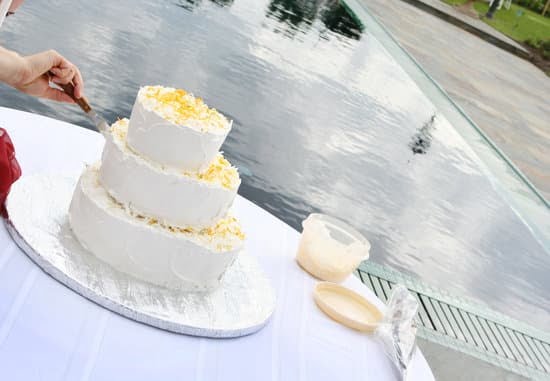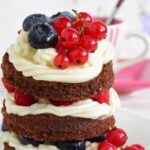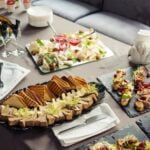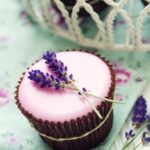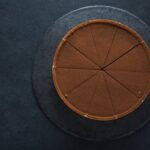Bundt cakes have become increasingly popular in the world of baking, and for good reason. With their distinct shape and elegant appearance, bundt cakes provide the perfect canvas for creative and stunning decorations. In this article, we will explore the art of decorating bundt cakes and provide you with expert tips and techniques to take your cake skills to the next level.
The unique shape of a bundt cake adds an element of sophistication that is unmatched by traditional round or square cakes. The ornate designs created by the intricate grooves in a bundt pan lend themselves beautifully to various decorating styles. From simple and elegant to bold and extravagant, there are endless possibilities when it comes to decorating these delightful cakes.
Decorating a bundt cake not only enhances its visual appeal but also elevates its overall presentation. Whether you’re preparing a cake for a special occasion or simply want to impress your family and friends, adding decorative elements can make your creation truly stand out. With some basic tools, techniques, and creativity, you can transform a plain bundt cake into a masterpiece that reflects your personal style.
So grab your piping bags, offset spatulas, and cake turntables – it’s time to dive into the world of bundt cake decorating. In the following sections of this article, we will guide you through every step of the process.
From preparing the perfect base for decoration to mastering buttercream frostings, creating fondant decorations, adding edible embellishments, and even transporting and storing your masterpieces – we’ve got you covered. Get ready to unleash your creativity as we delve into the wonderful world of bundt cake decoration.
Essential Tools for Bundt Cake Decorating
Decorating a bundt cake can be a fun and rewarding experience, but it requires the use of certain essential tools to achieve the best results. Here is a comprehensive list of tools that every baker should have on hand when decorating a bundt cake:
- Piping Bags: Piping bags are a must-have tool for many cake decorators. They allow you to create beautiful designs and decorations using various piping tips. Opt for reusable silicone or disposable piping bags for convenience.
- Cake Turntable: A cake turntable is an excellent investment for any decorator. It allows you to easily rotate your bundt cake while you work, ensuring smooth and even decorating all around.
- Offset Spatula: An offset spatula is ideal for spreading frosting and smoothing out buttercream on the unique contours of a bundt cake. Its angled design helps reach all the nooks and crannies effortlessly.
- Bench Scraper: A bench scraper or icing smoother is essential for achieving clean edges and smooth finishes on your bundt cake. Use it to scrape off excess frosting or fondant and create a neat appearance.
- Decorating Tips and Couplers: Invest in a variety of decorating tips such as round, star, petal, leaf, etc., along with corresponding couplers that allow you to interchange the tips easily while using the same piping bag.
- Cake Leveler: A cake leveler comes in handy when you want to trim the top of your bundt cake for an even surface before decorating. This tool ensures your finished cake presentation is flawless.
- Angled Spatulas: Angled spatulas, both large and small sizes, are useful for applying fillings, spreading ganache or glazes, or creating textured designs on your bundt cakes.
Remember that these are just some of the essential tools required for bundt cake decorating. Depending on your desired decorations and techniques, you may find other tools beneficial. Experiment and find the ones that work best for you.
Now that you have all the necessary tools, you’re ready to move on to preparing the perfect bundt cake base. It’s important to choose a bundt cake recipe that will hold up well to decorating and has a firm crumb structure. In the next section, we will share foolproof bundt cake recipes and provide tips on properly greasing the pan to prevent sticking. Stay tuned.
Preparing the Perfect Bundt Cake Base
Bundt cakes are not only delicious but also perfect for decorating. Their unique shape adds an element of visual interest and elegance to any dessert table. Whether you’re a beginner or an experienced baker, preparing the perfect bundt cake base is essential for successful and beautiful cake decorations.
When it comes to bundt cakes, using the right recipe is crucial. It’s important to choose a recipe that produces a dense, moist cake with a tight crumb structure. This will ensure that the cake holds its shape well during the decorating process. Some popular bundt cake flavors include vanilla, chocolate, lemon, and red velvet.
To prevent your bundt cake from sticking to the pan, proper greasing is essential. You can use butter or cooking spray to coat every nook and cranny of the pan, ensuring easy removal of the cake after baking. Be sure to pay attention to intricate areas of the pan design.
| Tips for Preparing the Perfect Bundt Cake Base |
|---|
| Use a bundt pan with an intricate design for added visual appeal |
| Choose a dense and moist bundt cake recipe with a tight crumb structure |
| Adequately grease the entire surface of the bundt pan before adding batter |
| Allow the cake to cool completely before removing it from the pan |
The Importance of Cooling Before Decorating
Once your bundt cake is baked to perfection, it’s vital to let it cool completely before you start decorating. Cooling allows the structure of the cake to stabilize and avoids any damage to the decorative elements. When a warm cake is frosted, the icing tends to melt and slide off due to the heat.
After taking the bundt cake out of the oven, let it sit in the pan for about 10 minutes before transferring it to a wire rack to cool completely. This process also helps the cake contract slightly from the sides of the pan, making removal easier. Trying to remove a warm bundt cake from the pan can result in sticking or breaking.
Patience is key when it comes to preparing a bundt cake base. Waiting for your cake to cool completely will yield better results when it’s time to apply frostings, fondants, or other decorations.
Crumb Coating Techniques
When it comes to decorating bundt cakes, one essential technique that should not be overlooked is crumb coating. Crumb coating serves as the foundation for a smooth and flawless finish on your cake, preventing any loose crumbs from interfering with the final design. In this section, we will discuss the necessity of crumb coating, provide step-by-step instructions for achieving excellent results, and share some pro tips along the way.
The first step in crumb coating your bundt cake is to prepare a thin layer of frosting or icing that acts as an adhesive for trapping any loose crumbs. This initial layer helps to create a smooth surface for adding additional layers and decorations later on. Start by placing your cake on a turntable or a flat surface that is elevated for easier access.
Begin by applying a thin layer of frosting using an offset spatula. Spread the frosting evenly over the entire cake, making sure to cover all areas including the crevices and nooks of the bundt shape. This initial layer does not need to be perfect; its purpose is just to capture any loose crumbs and seal them in place.
Once you have applied the initial layer, place the cake in the refrigerator for about 15-20 minutes to allow the frosting to set. This will help prevent any further crumbing when you add subsequent layers of frosting. After chilling, remove the cake from the refrigerator and apply another layer of frosting, this time aiming for an even and smooth finish.
To achieve a smooth crumb coat, use an offset spatula or a bench scraper to gently spread and smooth out any uneven areas or excess frosting. Take your time during this process as it sets the stage for creating a beautifully decorated bundt cake.
Pro Tips:
- Use an angled spatula or small brush to clean up any excess crumbs before applying each layer of frosting.
- If desired, tint your crumb coat with food coloring to match the final design or theme of your bundt cake.
- Experiment with different flavors of frosting for the crumb coat to add an extra delicious touch.
By mastering the technique of crumb coating, you will be well on your way to achieving professional-looking results with your decorated bundt cakes. With a smooth and flawless base, you can let your creativity shine through when it comes time to add additional layers, frostings, fondants, or edible embellishments.
| Essential Tools for Crumb Coating |
|---|
| – Offset spatula |
| – Cake turntable |
| – Bench scraper |
| – Angled spatula or small brush |
Mastering Buttercream Frosting for Bundt Cakes
Buttercream frosting is a classic choice for decorating bundt cakes due to its versatility and smooth texture. By mastering the art of buttercream frosting, you can create beautiful and delicious designs that will impress your friends and family. In this section, we will discuss the different types of buttercream frostings, provide a basic recipe, and share techniques for piping onto the unique shape of a bundt cake.
Types of Buttercream Frosting
There are several types of buttercream frosting that can be used to decorate bundt cakes. One popular option is American buttercream, which is made by creaming together butter, powdered sugar, vanilla extract, and a small amount of milk or cream. This type of frosting is easy to make and has a rich and sweet flavor.
Another common choice is Swiss meringue buttercream. It is made by heating egg whites and sugar over a double boiler until the sugar dissolves, then whipping it into a fluffy meringue before gradually adding in softened butter. Swiss meringue buttercream has a silky smooth texture and a less sweet taste compared to American buttercream.
For chocolate lovers, chocolate buttercream frosting is an excellent option. It can be made by adding cocoa powder or melted chocolate to either American or Swiss meringue buttercream recipes. The result is a decadent chocolatey frosting that pairs perfectly with any flavor of bundt cake.
Piping Techniques for Bundt Cakes
Decorating bundt cakes with buttercream frosting requires some special techniques due to their unique shape. Here are some tips for achieving professional-looking results:
- Start from the center: Begin piping from the center hole of the cake and work your way outwards in concentric circles.
- Use an open star tip: A large open star tip (such as Wilton 1M) creates defined ridges on the cake’s surface. Hold the piping bag at a 90-degree angle to create small rosettes or twist the bag as you pipe for a different effect.
- Add height: To create dimension, pipe additional layers on top of each other, gradually building up the design.
- Experiment with different patterns: Try various piping techniques such as shells, stars, or zigzagging lines to add visual interest to your bundt cake.
Remember, practice makes perfect when it comes to piping buttercream onto bundt cakes. Don’t be afraid to experiment and have fun with different designs and patterns. With time and patience, you’ll become a master at creating stunning buttercream decorations that will wow everyone who sees your beautifully decorated bundt cake.
Creative Fondant Decorations for Bundt Cakes
Fondant is a versatile medium that can be used to create stunning and intricate decorations for bundt cakes. With its smooth and pliable texture, fondant allows cake decorators to unleash their creativity and bring their ideas to life. In this section, we will explore some tips and techniques for creating beautiful fondant decorations for bundt cakes.
Rolling Out Fondant
Before you can start decorating your bundt cake with fondant, it’s important to know how to properly roll it out. Start by dusting your work surface with powdered sugar to prevent the fondant from sticking. Knead the fondant until it becomes soft and pliable, then use a rolling pin to roll it out to the desired thickness. Make sure to roll it evenly so that it doesn’t tear or stretch in certain areas.
Covering the Entire Cake
Once you have rolled out your fondant, you can cover the entire bundt cake with it for a seamless finish. Start by draping the rolled out fondant over the cake, making sure that it covers all of the nooks and crannies of the shape. Gently smooth down the fondant with your hands or a smoothing tool, working from top to bottom and ensuring there are no air bubbles trapped underneath.
Creating Fondant Accents
In addition to covering the entire cake, you can also use fondant to create decorative accents like flowers or bows. To make flowers, roll small pieces of colored fondant into thin strips and shape them into petals using flower-shaped cookie cutters or silicone molds.
Layer the petals together using edible glue or water, starting with larger petals on the outside and smaller ones on the inside. For bows, cut out rectangular strips of fondant and fold them into loops in a bow shape before attaching them to the cake with edible glue.
Remember that fondant decorations should be made in advance to allow them to dry and harden. This will make them easier to handle and attach to the cake without losing their shape. Once your fondant decorations are ready, you can use edible glue or water to secure them onto the surface of your bundt cake.
Decorating bundt cakes with fondant allows for endless possibilities when it comes to creating unique and eye-catching designs. Whether you’re a beginner or an experienced decorator, fondant decorations will surely impress your guests and add a touch of elegance to any occasion. So don’t be afraid to let your imagination run wild and experiment with different colors, shapes, and textures when decorating your bundt cakes with fondant.
Adding Edible Embellishments
Using Edible Pearls
One way to add elegance and sophistication to your decorated bundt cake is by using edible pearls. These small, round decorations can instantly elevate the look of your cake and give it a luxurious touch. Edible pearls can be found in various sizes and colors, allowing you to customize the design according to your preferences.
To apply edible pearls onto your bundt cake, you can either place them individually or use them to create patterns or borders. Use a pair of tweezers or a toothpick to carefully pick up each pearl and gently press it onto the buttercream frosting. Ensure that they are evenly spaced and adhere well to the cake.
Incorporating Sprinkles or Colored Sugars
If you’re looking for a quick and easy way to add some fun and color to your bundt cake, consider using sprinkles or colored sugars. Sprinkles come in a wide range of shapes, sizes, and colors, allowing you to get creative with your decorations. You can sprinkle them generously all over the buttercream frosting or selectively place them in specific areas for a more controlled look.
Another option is colored sugars, which are essentially granulated sugar that has been dyed with food-safe coloring. These sugars make for a great way to add a touch of sparkle or texture to your decorated bundt cake. Simply sprinkle the colored sugars onto the buttercream frosting before it sets.
Tips for Applying Edible Embellishments
When applying edible embellishments onto your decorated bundt cake, it’s important to do so mindfully and evenly for an aesthetically pleasing result. Here are some tips:
- Consider the Design: Think about how different edible embellishments will complement the overall design of your bundt cake. Choose colors and shapes that will enhance the theme or style you have chosen.
- Use Your Palette Knife: A palette knife can be a handy tool for applying edible decorations onto your bundt cake. It allows for precise placement and helps to create clean lines and patterns.
- Add Decorations Strategically: Think about where you want to add the edible embellishments. Consider creating focal points or using them to draw attention to certain parts of the cake.
- Work in Sections: Rather than applying all the decorations at once, work in sections. This will help you maintain control over the design and ensure that each area is properly adorned.
Remember, adding edible embellishments is an opportunity to showcase your creativity and personality. Don’t be afraid to experiment with different colors, shapes, and textures to create a truly unique decorated bundt cake that will impress your guests.
Transporting and Storing Decorated Bundt Cakes
Transporting and storing decorated bundt cakes can be a challenge due to their unique shape and delicate decorations. However, with the right tools and techniques, you can ensure that your beautifully decorated bundt cake arrives safely at its destination and stays fresh for longer. In this section, we will discuss the challenges of transporting decorated bundt cakes and provide tips for safe transportation as well as proper storage.
When it comes to transporting a decorated bundt cake, one of the biggest concerns is preserving the design and preventing any smudging or damage. One option is to use a specialized cake carrier designed specifically for bundt cakes. These carriers usually have a high dome lid that provides enough space for taller decorations and prevents them from getting squished during transportation.
If you don’t have a dedicated cake carrier, there are other methods you can use to ensure the safety of your decorated bundt cake. One popular method is to place a clean kitchen towel or non-slip mat on the floor of your car’s trunk or backseat.
Then, place the cake on a stable surface such as a baking sheet or an upside-down plate before placing it on top of the towel or mat. This will prevent any sliding or movement during transportation.
Properly storing a decorated bundt cake is essential for maintaining its freshness and preserving its decorations. When storing your bundt cake, it’s important to protect it from drying out by covering it with plastic wrap or an airtight container. If your cake has perishable fillings or frostings, such as cream cheese frosting, it’s best to refrigerate it.
To keep your decorated bundt cake in optimal condition while refrigerated, cover it loosely with plastic wrap to prevent condensation from forming on the surface of the cake. Alternatively, you can use toothpicks inserted into the top of the cake and drape over plastic wrap without touching the frosting.
By following these tips for transporting and storing your decorated bundt cakes, you can ensure that your creations arrive intact and stay fresh for longer. With a little extra care and attention, you can enjoy your beautifully decorated bundt cake at your desired destination or save it for later enjoyment.
Conclusion
In conclusion, bundt cake decorating is a delightful way to elevate the presentation of these unique cakes. Throughout this article, we have discussed essential tools and techniques to help you achieve beautiful and professional-looking decorations. From preparing the perfect bundt cake base to mastering buttercream frosting and creating fondant decorations, there are endless possibilities to explore.
By following the tips and instructions provided, you can unleash your creativity and experiment with different designs and flavors. Whether you prefer classic buttercream flowers or modern geometric patterns, there is no limit to what you can achieve with bundt cake decorating.
Remember, practice makes perfect. Don’t be discouraged if your first attempt doesn’t turn out exactly as planned. The key is to have fun while learning new techniques and trying out fresh ideas. As Julia Child once said, “The only real stumbling block is fear of failure. In cooking, you’ve got to have a what-the-hell attitude.” So go ahead and embrace your inner artist in the kitchen.
Frequently Asked Questions
How do you decorate the top of a bundt cake?
Decorating the top of a bundt cake can be done in several ways to add visual appeal and enhance its presentation. One popular option is to dust the cake with powdered sugar or cocoa powder, which gives it a simple yet elegant finish. Another way is to drizzle a glaze over the top, allowing it to cascade down the ridges and create an attractive pattern.
Additionally, you can embellish the cake by placing fresh fruits, such as berries or sliced citrus, strategically on top for a burst of color and freshness. Lastly, some people opt for piping decorative frosting onto the cake using a piping bag and various tips to create intricate designs or patterns that complement the shape of a bundt cake.
What is the best way to put icing on a bundt cake?
When it comes to putting icing on a bundt cake, one of the best methods is to spoon or pour it over the cooled cake. After preparing your desired icing, allow it to cool slightly until it thickens slightly but remains pourable. Then, position your bundt cake on a wire rack placed over a baking sheet or parchment paper to catch any drips.
To start, gradually pour the icing onto the center of the cake while moving in a circular motion outward towards the edge of the bundt pan. This technique ensures that the icing moves smoothly over all parts of the cake surface and drizzles into any crevices or ridges for an even distribution of flavor.
Do you glaze a bundt cake hot or cold?
Glazing a bundt cake can be done when either hot or cold depending on your preference and desired outcome. Some people prefer applying glaze when the bundt cake is still warm from being freshly baked as this allows for better absorption into the sponge-like texture, resulting in added moisture throughout each bite. However, if you choose this method, exercise caution not to pour an excessively hot glaze over your hot bundt cake as it may cause both glaze and cake to become too thin or unstable respectively.
On the other hand, glazing a bundt cake that has cooled down brings a different appeal. Cold glazes will often create a shiny, hardened layer on top of the cake, adding an extra texture and visual contrast while sealing in moisture. Ultimately, whether to glaze hot or cold depends on personal preference, desired effect, and the specific recipe being used.
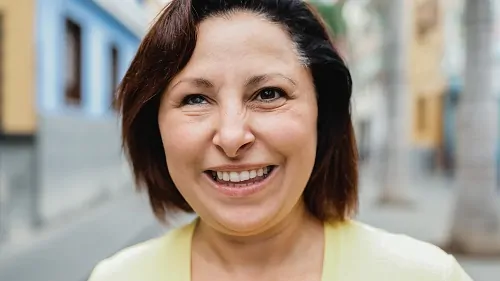
Welcome to our cake decorating blog! My name is Destiny Flores, and I am the proud owner of a cake decorating business named Cake Karma. Our mission is to provide delicious, beautiful cakes for all occasions. We specialize in creating custom cakes that are tailored specifically to each customer’s individual needs and tastes.

